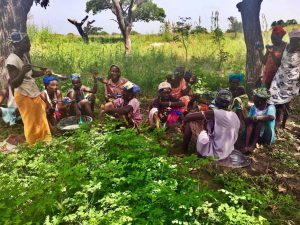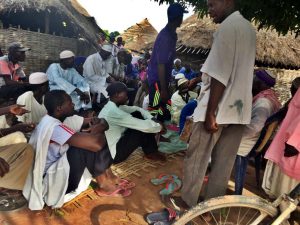This project is made possible through the partnership of WATER CHARITY and the NATIONAL PEACE CORPS ASSOCIATION. ![]()
 Location
Location
Sare Dembayel, Kolda, Senegal
Community Description
Sare Dembayel is a village in the Kolda region, with an estimated population of 900. The main ethnic group is Fulakunda, with a few PulaFuta households. Sare Dembayel is located 13 kilometers from the National Road.
At their closest “Road Town,” Mampatim, one can potentially access a wider range of food, education, and medical care. However, due to the long-distance and difficult terrain, community members are often limited to the options presented within Sare Dembayel.
The Regional Capital, Kolda, is 67 kilometers from Mampatim. In Kolda, one can access the hospital to address more serious ailments and materials that the Road Town does not hold. To travel there, one must walk or bike 13 kilometers to Mampatim and wait for a small bus that has an irregular schedule. A few community members own scooters or older motorcycles, but paying for a ride is expensive and not an option most people can opt for.
Pertinent structures within the village include a primary school, a mosque, several small boutiques, and a health hut. Beyond these buildings, community members and youth must seek alternate and inconvenient options for education and health. Most times, children are not able to pursue higher education beyond the primary school level, and they typically start working at a young age in their family’s fields.
 Depending on the season, the village may be vastly empty, with children and adults alike working in their fields. Upon returning from their work, community members relax by drinking and sharing tea with one another, while sitting on a large mat under a shady tree. Children play with one another with makeshift balls and homemade toys. Young girls must balance taking care of younger children and cooking and cleaning for their families. These chores usually take precedence over education and enjoying time with friends and family.
Depending on the season, the village may be vastly empty, with children and adults alike working in their fields. Upon returning from their work, community members relax by drinking and sharing tea with one another, while sitting on a large mat under a shady tree. Children play with one another with makeshift balls and homemade toys. Young girls must balance taking care of younger children and cooking and cleaning for their families. These chores usually take precedence over education and enjoying time with friends and family.
When community members are sick, they do not have the financial means nor the physical energy to travel to the “health post,” which is like a local clinic. As a result, deaths occur annually from common and preventable health risks, mostly affecting the youth.
Because of the lack of jobs or financial incentives available in the village, men often seek seasonal or year-round work in more populated areas of Senegal, or in some cases, work abroad in surrounding countries. However, these jobs are difficult to obtain and sustain.
Throughout the year, community members plant, tend and harvest their fields of rice, corn, millet, peanuts, and cotton.
Problem Addressed
A variety of factors play a significant role in the village’s poor health and the lack of infrastructure can lead to discouraging health outcomes. Due to the unavailability of sanitation infrastructure, open defecation is a dangerous practice rampant within the community and can exacerbate health and safety issues that are otherwise preventable, such as diarrhea and fecal contamination of water and food.
 Of the 70 compounds surveyed, 18 households reported having “non-functioning latrines”- meaning that efforts towards constructing latrines have been initiated, but due to the lack of materials and knowledge surrounding latrine construction, they are no longer in use. Therefore, 65 compounds of these 70 currently open defecate into the bush, roughly translating into 828 people out of 900 who must open defecate, as there are no other means.
Of the 70 compounds surveyed, 18 households reported having “non-functioning latrines”- meaning that efforts towards constructing latrines have been initiated, but due to the lack of materials and knowledge surrounding latrine construction, they are no longer in use. Therefore, 65 compounds of these 70 currently open defecate into the bush, roughly translating into 828 people out of 900 who must open defecate, as there are no other means.
Currently, the mosque does not have a latrine. Several community members frequent the mosque, especially on Fridays, and people from surrounding areas also visit the mosque, as they do not have a mosque in their villages. A nearby household has a latrine that they have opened for mosque Attendees. However, this latrine is becoming too dilapidated for use, as it is poorly constructed.
In survey responses, community members have emphasized the inconveniences and detrimental health effects of open defecation. Reoccurring and common responses include:
– the insufficient separation between feces and human contact
– children playing in the bush and bringing the fecal matter back to the household and to family members
– the inconvenience of going to the bush during times of sickness (i.e. diarrhea), night time, and relentless rains
– water during the rainy season washing fecal matter into the compounds, subsequently affecting water and food sources
– inability to provide a place to defecate for guests and visitors
Project Description
This project is to build 25 single-ventilated pit latrines, 24 at the household level and one at the mosque.
Beneficiaries will pay an 11,000 CFA (~20 USD) contribution. Each will Dig a pit that is 2 meters by 2 meters by 2 meters (depth x width x length), and gather and bring sand, gravel, and water for mason and brick-makers. They will attend a health talk concerning Water and Sanitation Hygiene behaviors and latrine maintenance.
The mason and brick-makers will:
– Create bricks from 6 bags of cement to surround the pit
– Mason will line bricks with cement
– Iron grid (4 bars) will create a structure for the pit cover, connected with iron wire, covered with gravel and cement
– Two meters of PVC Pipe and the PVC Coude will be used to connect the seat to the pit foot holdings will be constructed with remaining cement.
– Remaining PVC Pipe and a T connecting piece will be connected above the latrine and serve as a ventilation pipe
– With remaining iron, the mason will construct a makeshift “door handle” so that once the pit is full, latrine-owners will have the opportunity to empty the latrine.
An approximate timeline for brick-making is about two days, with daybreak prior to the mason’s arrival so that the cement can successfully solidify, while masonry work will require about two days.
The committee members and the Peace Corps Volunteer will create and lead hand-washing demonstrations and periodically update one another on the progress of the project and if there are any concerns. The mason has had several pieces of training on WASH-related topics and has received formal training on latrine construction. In addition, he has committed to attending these health talks for the households to teach members how to care for a latrine and what to do once it is full and ready to be emptied.
Health talks will be conducted at the household level so that attendance can be assured and understanding of the information presented reinforced. Community members will attend talks to build knowledge surrounding proper Water and Sanitation Hygiene (WASH) practices and understand the proper care of latrines.
Upon distributing soap and hand-washing materials, household members will be asked to demonstrate proper hand-washing and relay the importance of hand-washing in relation to common illnesses. At the 3-month mark, surveys will be conducted to determine if the hand-washing materials provided are still in use, specifically after using the latrine.
Project Impact
The project will benefit 400 people, comprised of people from 24 households and the mosque in the community.
Peace Corps Volunteer Directing Project
Dorothy Nam
Monitoring and Maintenance
The Peace Corps Volunteer will conduct surveys 3 months after completion to assess the effectiveness of hand-washing materials, and follow-up on latrine maintenance and care.
The mason and brick-makers will present latrine care information at health talks.
The households will regularly maintain and repair their individual latrines upon completion.
Fundraising Target
$4,400
Funds raised in excess of the project amount will be allocated to other projects in the country.
Donations Collected to Date
$587
ADOPT THIS PROJECT BY CONTRIBUTING THE DOLLAR AMOUNT OF THE PROJECT.
Donations of any amount will be appreciated. The full amount will give you “naming rights” if that is something you would like.
Dollar Amount Needed
$3,813 ![]()